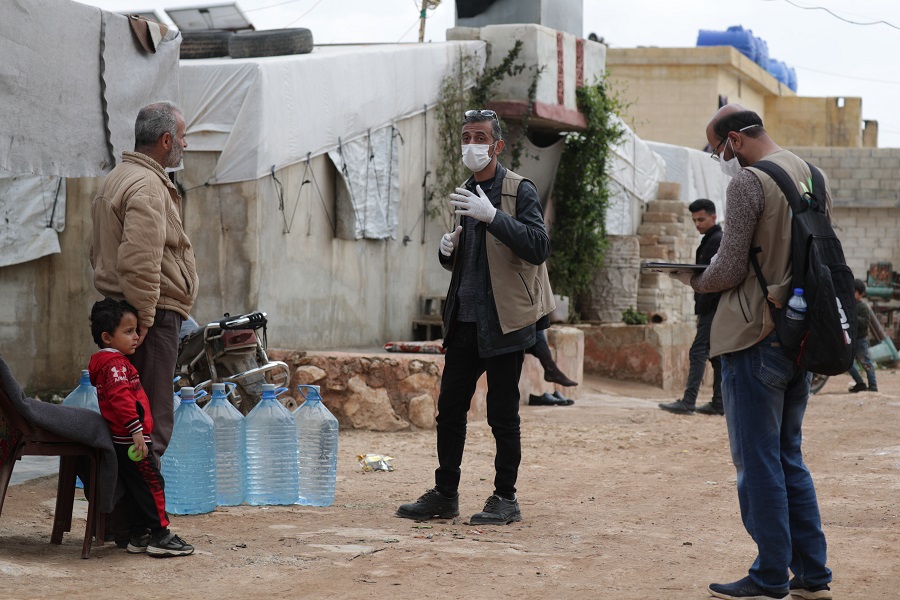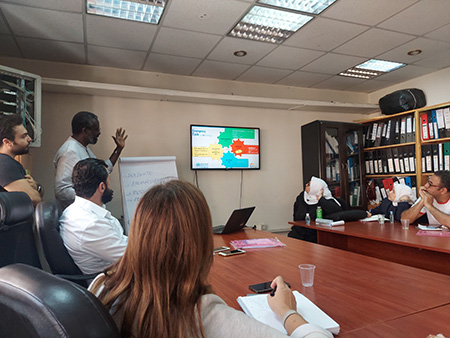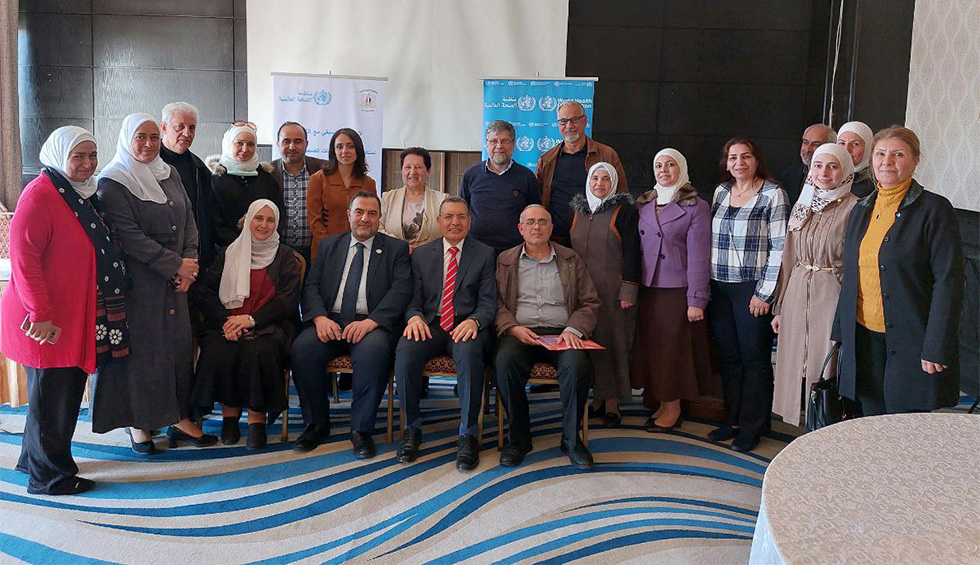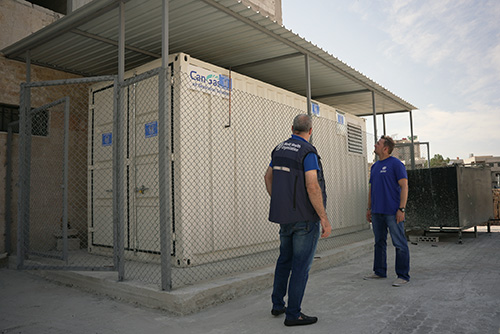Whole of Syria cholera operational review to inform more effective response actions
 Community health workers in the Mashhad Rouhin camp in Idlib, northwestern Syria, talk to a resident to raise awareness of an ongoing cholera epidemic. Credit: WHO//Khalil Ashawi
Community health workers in the Mashhad Rouhin camp in Idlib, northwestern Syria, talk to a resident to raise awareness of an ongoing cholera epidemic. Credit: WHO//Khalil Ashawi
Cairo, 6 September 2023 – Affected by conflict for more than 12 years, Syria is experiencing a protracted complex political and socioeconomic crisis. The country has been grappling with various recurrent epidemics and outbreaks amid the severely deteriorated living conditions.
Collective efforts have been made at the Whole of Syria level, and in all operational response areas, to contain and respond to the cholera outbreak. Health, risk communication and community engagement (RCCE) and water, sanitation, and hygiene (WASH) partners are supporting several activities based on various response pillars.
An operational review of the ongoing cholera outbreak response in Syria was carried out in May 2023. Recommendations of the review report include to:
address gaps in surveillance, WASH, and infection prevention and control;
scale up the system for referrals, especially from hot-spot areas;
strengthen the supply chain;
support the rehabilitation, operation and maintenance of water and sanitation infrastructure;
foster community engagement and inclusion, and unify messaging among partners, to ensure an effective and sustainable response.
Cholera operational review process
The cholera operational review for the Whole of Syria response concluded on 16 May 2023. Fifty-five experts took part – including representatives of the WASH and Health clusters, RCCE coordinators, technical officers from the United Nations Children’s Fund (UNICEF) and WHO, plus other partners.
“The Whole of Syria intersectoral review of the cholera preparedness and response plan is a critical step to ensure we are responding effectively to the cholera outbreak in all parts of the country,” said Dr Iman Shankiti, acting WHO Representative to Syria. “It also provides a foundation for collaborative learning – building upon experiences over the past year and positioning Syria to effectively manage cholera risk and strive for elimination in the country through an integrated approach.”
Review participants examined the ongoing cholera outbreak response in Syria, discussed actions to date and identified key challenges. A qualitative participatory approach was used, guided by the “WHO guidance for after action review [1]”, the Global Taskforce for Cholera Control (GTFCC) Cholera Preparedness and Response Framework [2] and the Whole of Syria response plans.
The review report recommends various short-term corrective actions. It also sets out strategic actions that will help to eliminate cholera in the country in the longer term.
A Whole of Syria cholera intra-action review report will now be prepared. Its purpose will be to inform future actions and strategies; to update the July–December 2023 Cholera Response Plan – including by identifying high-risk areas for preparedness, prevention, and response, and developing targeted prioritization activities plan accordingly.
Background to cholera outbreak and response
Some 6.9 million people in Syria are internally displaced and up to 90% of the population live below the poverty line.
Currently, at least 8 million people in the country are at increased risk of acute watery diarrhoea owing to the ongoing water crisis, damaged water and sanitation networks, overcrowded sites for displaced people, and lack of access to WASH services.
The devastating earthquake of February 2023 disrupted the cholera response in Syria. The disaster also increased the risk of cholera, with reception centres sometimes overcrowded, fragile WASH infrastructure damaged, and response partners’ access and capacity curtailed.
Related link
Whole of Syria cholera intra action review report, July 23 2023
[1] WHO Guidance for after action review
[2] The Global Taskforce for Cholera Control (GTFCC): organization of the response
MOH and WHO are working to establish Syria’s first Public Health Emergency Operations Centre
 3 September 2023– Damascus, Syria – The World Health Organization (WHO) is working with the Syrian Ministry of Health (MoH) to establish the country’s first Public Health Emergency Operations Centre (PHEOC). The PHEOC will be located in Damascus and is expected to be operational by the end of the year.
3 September 2023– Damascus, Syria – The World Health Organization (WHO) is working with the Syrian Ministry of Health (MoH) to establish the country’s first Public Health Emergency Operations Centre (PHEOC). The PHEOC will be located in Damascus and is expected to be operational by the end of the year.
The recent COVID-19 pandemic has highlighted the need for ever closer vigilance and cooperation among countries. The PHEOC will support Syria’s commitments under the International Health Regulations (2005), which require countries to develop, enhance and maintain their capacity to respond promptly and effectively to public health risks. It will serve as a central point for emergency planning and for gathering, analyzing and disseminating information on the impact of any emergency on the Syrian health system and health care facilities. The PHEOC concept and network were first established by WHO in 2012.
WHO has rehabilitated and equipped the PHEOC and is currently focusing on operationalizing it . In addition to providing equipment and training, WHO is working closely with Ministry of Health to develop the legal framework and PHEOC handbook. The framework will legalize the installation of the EoC structure within the health system and identify the role and responsibilities of the EoC towards different units, programs, and sectors. The PHEOC handbook will serve as a guide for the EoC team, including the scope/mode of work, monitoring and evaluation, and response mechanisms.
“The establishment of Syria’s first PHEOC will mark an important milestone in our efforts to improve health security in the country,” said Dr Iman Shankiti, WHO Representative a.i. “The PHEOC will provide an essential platform for the coordination of public health emergencies, and will help ensure that Syrians are better protected from future health threats.”
“It is our objective to assist the MoH in building a strong PHEOC to support future public health emergencies,” said Samar Hammoud, WHO Regional Technical Emergency Officer.
Following the launch of the first PHEOC, the MoH plans to establish sub-national PHEOCs in all 14 governorates, beginning with Lattakia and Aleppo. A network of PHEOCs throughout the country is expected to enhance cooperation between experts in the different governorates and help bypass political and geographical barriers to collaboration.
Towards universal health coverage: Syria develops strategy for primary health care

8 August 2023 – In order for every Syrian to have accessible, equitable, effective, and high-quality health care and nutrition services, the Ministry of Health has led the development of Syria’s strategy for primary health care 2023–2027 through a participatory process, soliciting input from all units and departments, as well as other line ministries, nongovernmental organizations, United Nations agencies and health partners. Stakeholders worked to collectively identify technical and operational health needs and gaps, together with the priorities and interventions required to address them.
The PHC strategy provides a roadmap for the recovery of the health system and will serve as a crucial first step in closing the implementation gap to achieve Syria’s 2030 goals and operationalize its national health strategy. Additionally, Syria’s PHC strategy is a crucial step towards achieving universal health care in the country. It affirms the 1978 Declaration of Alma Ata and the 2018 Declaration of Astana, which state empirically the importance of a well-functioning PHC system as a cornerstone to achieving universal health care for all.
In order to enhance health systems, the PHC strategy is grounded in 2 key components: the family health care model to scale up the delivery of health and nutritional services, management of childhood illness and routine immunization; and strengthened partnerships for health care delivery, such as community outreach through the healthy villages programme. To drive implementation, a detailed action plan will be developed, costed and monitored.
Dr Iman Shankiti, WHO Representative a.i. in Syria, stated, "WHO is pleased to support the Ministry of Health in taking a major step towards universal health coverage with the launch of the strategy for primary health care. This robust plan will serve as a beacon for Syria's health sector transformation, emphasizing primary health care as a foundation for a resilient health system. Looking ahead, investment in the PHC strategy has the potential to impact the lives of millions of Syrians by ensuring access to the care they need, reducing health care costs and improving health outcomes, particularly for those most vulnerable and in need.”
Strengthening healthcare in crisis: WHO equips national hospitals in Homs, Daraa, and Dummar with oxygen generators
 25 June 2023 – As part of its ongoing commitment to strengthen health systems in regions affected by crises, the World Health Organization (WHO), in collaboration with its donors, has delivered three oxygen generators to three public hospitals: Dara’a National Hospital, Homs National Hospital, and Dummar National Hospital in Damascus. Known as Pressure Swing Adsorption (PSA) plants, these oxygen generators will support the lives of hundreds of critical patients in Syria – such as those with cardiac and respiratory conditions, or those requiring intensive care – by ensuring reliable and economical on-site oxygen supply and facilitating the filling of oxygen cylinders.
25 June 2023 – As part of its ongoing commitment to strengthen health systems in regions affected by crises, the World Health Organization (WHO), in collaboration with its donors, has delivered three oxygen generators to three public hospitals: Dara’a National Hospital, Homs National Hospital, and Dummar National Hospital in Damascus. Known as Pressure Swing Adsorption (PSA) plants, these oxygen generators will support the lives of hundreds of critical patients in Syria – such as those with cardiac and respiratory conditions, or those requiring intensive care – by ensuring reliable and economical on-site oxygen supply and facilitating the filling of oxygen cylinders.
The deliveries of these oxygen generators are funded by the Middle East Response grant of the Global Fund to Syria, through IOM (UN Migration Agency) and WHO. Additional resources were mobilized through the COVID-19 Response Mechanism of the Global Fund, in partnership with the Ministry of Health. This collaborative effort aims to enhance public health and pandemic preparedness capacities in Syria for the long term.
Dr. Iman Shankiti, WHO's Acting Representative in Syria, said, "Working closely with the Ministry of Health, WHO is dedicated to bolstering the capacity of public health facilities across Syria. The provision of these oxygen plants to national hospitals is a testament to this commitment. Amidst the ongoing crisis in the country, our mission remains clear: to ensure access to quality healthcare services for those in need."
The three recipient national hospitals provide free public health services. Homs National Hospital, which includes two operating rooms, a twelve-bed inpatient ward, and four intensive care units (ICUs), has been equipped with an oxygen generator with a capacity of 20m3/h. Dara’a National Hospital, with 160 beds and 10 ICU beds, has also received an oxygen generator with a capacity of 40m3/h. Lastly, the Dummar National Hospital, planned to be an isolation hospital for communicable diseases and currently housing 30 beds and 18 ICU beds, now boasts an oxygen generator with an 18m3/h capacity. By leveraging the Pressure Swing Adsorption (PSA) process, these generators separate oxygen from other gases present in the air and mark a significant step towards strengthening Syria's healthcare system.
We recognize the national hospitals in Syria and their dedicated team of professionals for their unwavering service to their communities under ever-challenging conditions. It is essential that we continue to strengthen Syria's health system to ensure resilience and leave no one behind.


